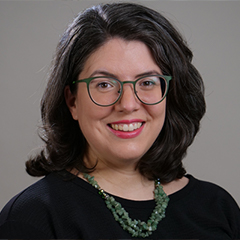Lauren Pabst, Senior Program Officer, Journalism and Media, shares insights on how we shape history and tell stories from a panel at the 2020 Sundance Film Festival.
In the midst of the global coronavirus pandemic, we are told we are living in historic times.
While this phrase may conjure a sense of inevitability—we must remember that history is not inevitable—in fact, we are editing it every day.
Back in January, MacArthur’s Journalism and Media program and Fellows program joined forces to present a panel called “Editing History” at the 2020 Sundance Film Festival.
We wanted to have a conversation across disciplines about how we can look to the past to examine the way our collective histories have been told, misrepresented, redacted, or not told at all. Our goal with this big idea was to reclaim and reframe how we understand our collective context.
We invited Violeta Ayala, Assia Boundaoui, Aymar Jean Christian, Eve L. Ewing, and Gene Luen Yang (2016 MacArthur Fellow), five extraordinary storytellers whose work spans the disciplines of journalism, scholarship, documentary filmmaking, historical fiction, graphic novels, comics, virtual reality, interactive media, open television production, sociology, poetry, K-12 education, activism, and more.
The panelists talked about how their work both reframes what happened in the past and how we can collectively use that same energy to build a more equitable future. I had the honor of moderating the conversation.
We talked about uprooting destructive and restrictive patterns that have dictated who has controlled the narrative, history, and the official story. We talked about power, decolonization, objectivity, collective imagination, and the concept of time (something we may all be pondering now). We also talked about superheroes.
It was a powerful conversation—and we are fortunate to be able to share with you a video of the panel in its entirety, filmed by the Sundance Institute Content Team and introduced by Tabitha Jackson, Director of the Sundance Film Festival. You can find the full-length video at the end of this piece.
If you are pressed for (linear) time, we have identified some suggested highlights. Violeta Ayala is a Quechua filmmaker, journalist, and activist originally from Bolivia. She spoke about how colonization shows up in narratives and what it looks like to decolonize the storytelling process.
Assia Boundaoui is an Algerian-American filmmaker and journalist, whose work has investigated the FBI surveillance of her community in Bridgeview, Illinois. She spoke about surveillance; her new project, the Inverse Surveillence Project; and the destructiveness of secret archives.
Aymar Jean Christian is a scholar, creator, and executive producer of OTV—an open television production studio in Chicago, focused on providing a platform for intersectional storytellers. He spoke about OTV and how it disrupts the obsession with scale, while also reclaiming the history of television.
Gene Luen Yang writes graphic novels and comic books, including a two-volume historical fiction graphic novel Boxers and Saints that explores the Boxer Rebellion in 19th-Century China. He spoke about the origins of the model minority myth.
Eve L. Ewing is a scholar, sociologist, writer, and poet; she also writes comic books and identifies as an Afrofuturist. She shared her reflections on the nature of time and intergenerational struggle.
Eve and Gene spoke about mythology and superheroes—and what the two have in common.
Assia, Violeta, and Eve also tackled the idea of objectivity—which is held up by some as the “gold standard of journalism” and of histories—and shared their thoughts on who can be considered objective and why.
While we are encountering forces beyond our control, there is heightened awareness of the importance of the choices we make and what they communicate about our values.
What our extraordinary panelists remind us of is our opportunity to recognize our place in a expansively long timeline, to interrogate the assumptions of dominant narratives, and claim our collective power to shape our own stories. This is more important than ever.
View the full event video below.




